#mary crawford
Text
I'm feeling like supporting some women's wrongs! (And rights, but definitely also wrongs.)
#anghraine babbles#poll nonsense#thought of going more tournament style but i'm too lazy :P#carmilla#vittoria corombona#mary crawford#austen blogging#attolia irene#catra#she ra and the princesses of power#this is an attolia irene appreciation blog#tar ancalimë#legendarium blogging#lucrezia borgia#political shenanigans and codependent siblings#procne#the metamorphoses#miranda lawson#the adventures of space redacted#cersei lannister#asoiaf#kuvira#avatar: the legend of korra#clytemnestra#the oresteia#man it was hard to choose between mary and ly susan but i had to go with my eternal fave mary
763 notes
·
View notes
Note
Do you think the Austen heroines will get along with each other? Who do you think will become close friends and whose personalities will clash? (please include secondary heriones like Jane Bingley, Marianne, Jane Fairfax, Miss Crawford etc.) in your analysis as well
To be honest, I think most of them would get along because of the societal demands of mixing and their solid moral base, but here are some predictions:
Best friends:
Marianne Dashwood & Fanny Price, both of them are super into poetry and rhapsodizing about the outdoors. Marianne can stand up to Fanny's attackers and Fanny can teach Marianne some temperance.
Elinor Dashwood & Jane Bennet, they both are carrying the family in times of need, both disappointed in love through no fault of their own. Elinor's clearer-eyed view of the world would help Jane take off those rose-coloured glasses, but Jane's love and hope would be warm to Elinor.
Elizabeth Bennet & Fanny Price, extrovert/introvert adoption. Elizabeth is delighted when Fanny finally starts to talk and it turns out she's super smart, but she would have kept her anyway.
Jane Fairfax & Fanny Price, in very similar situations and similar personalities, they get each other. Fanny is very worried about this Frank Churchill character.
Catherine Morland & Emma Woodhouse, a healthier and more equal version of the Harriet/Emma dynamic. And given social class, this is one that can be sustained long term. Catherine starts by admiring Emma and then catches up with her.
Harriet Smith & Catherine Morland, they would get so deep into novels together it'd be amazing. The fanfics these girls would write together.
Caroline Bingley & Emma Woodhouse, they would enjoy making fun of Miss Bates behind her back... they would make each other worse. Eventually Emma would look at herself in the mirror with disappointment.
Anne Elliot & Anyone, please anyone who is an intellectual equal. Do you see the people that she has to put up with? It's literal torture. I could see Fanny Price, Elizabeth Bennet, or Jane Fairfax.
Mentor/Mentee:
Catherine Morland & Anne Elliot, Anne is the oracle of all knowledge and Catherine admires her exceedingly. (Fanny Price would also work here)
Elizabeth Bennet & Anne Elliot, Elizabeth could learn so much from her! Anne would see through Wickham in a minute. They could play some duets too!
Georgiana Darcy & Anne Elliot... just send everyone over to Anne Elliot. She's the group mentor.
Instant Hatred:
Elizabeth Bennet & Emma Woodhouse, Emma would be too much like Darcy and Elizabeth would hate her snobbiness. They would likely become friends in time, but it would be after a good deal of dislike.
Marianne Dashwood & Emma Woodhouse, Emma is not impressed by the drama and HOW DARE YOU CALL MR. KNIGHTLEY OLD! Marianne doesn't like Emma's attitude.
Elizabeth Bennet & Mary Crawford, they are similar and their personality tends not to like each other. Also, Mary C would probably try to take a mentor role with Elizabeth (as one who knows about town) and Elizabeth would hate her for it.
Catherine Morland & Marianne Dashwood, Marianne is astounded by Catherine's ignorance, because it tends in a different direction than her own.
(Honestly, the most clashing personalities are Marianne Dashwood and Emma Woodhouse, someone like Elinor Dashwood, Anne Elliot or Fanny Price can put up with almost anything placidly)
Bonus: Miss Bates & Mrs. Jennings would LOVE each other. They would totally talk at the same time. Another older lady pairing that would work is Lady Bertram and Mrs. Allen.
Feel free to add!
#friend pairings#jane austen#anne elliot#jane bennet#elizabeth bennet#catherine morland#marianne dashwood#elinor dashwood#emma woodhouse#harriet smith#mary crawford
243 notes
·
View notes
Text



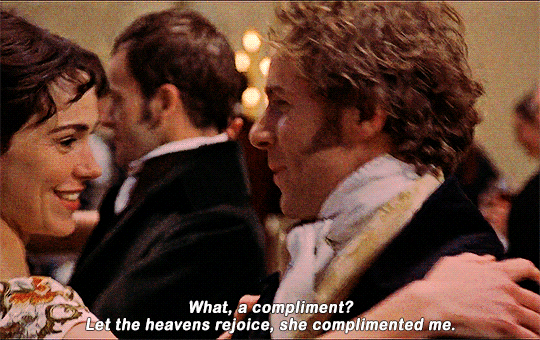
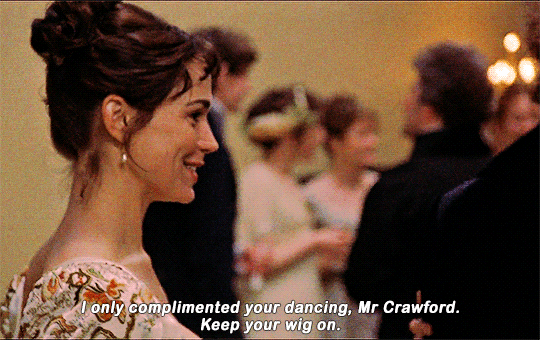
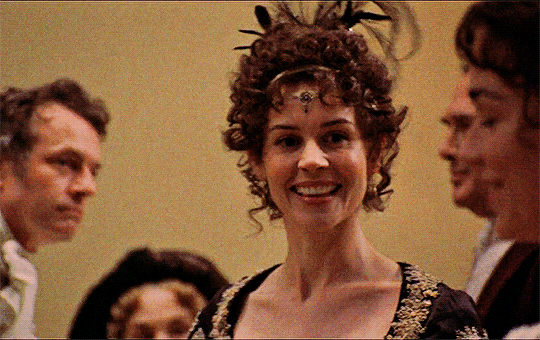
...he had once seen Fanny dance; and it was equally true that he would now have answered for her gliding about with quiet, light elegance, and in admirable time. -Mansfield Park, Chapter 6, Vol. II / Mansfield Park 1999
#filmedit#austenedit#mansfield park#patricia rozema#perioddramaedit#perioddramacentral#perioddramasource#jane austen#henry crawford#fanny price#mary crawford#fanny x henry#henry crawford x fanny price#this scene this convo this dance this soundtrack!!!!#I love how she's barely civil to him and he just loses it lmfao#also the fact that they both have a bad case of heart eyes going on#mine
167 notes
·
View notes
Text
I'm in the Fanny Price Defence Squad but I am also very much in the Mary Crawford Defence Squad. Sorry I'm very powerful.
#mansfield park#austen posting#engposting#jane austen#fanny price#mary crawford#THEY BOTH ARE GOOD I LIKE THEM BOTH#MARY CRAWFORD DID NOTHING WRONG
102 notes
·
View notes
Text
Mansfield Park - Henry Crawford and Fanny Price
I want to lay out how I see these characters and their relationship, because to me they seem to be set up as a deliberate contrast to Pride and Prejudice. At the tine of Henry’s first proposal, they are in a similar place to Elizabeth and Darcy at the time of Darcy’s first proposal, albeit with extremely different personalities than those characters: Fanny refuses him despite his wealth and her economic precarity because she cannot like or even respect him. However, Fanny, who is far shyer than Elizabeth, cannot lay out in direct and specific terms the foundation of her disapprobation of him.
From there, Henry sets out to win her regard in ways that very closely recall some of the events between Elizabeth and Darcy.
1) He does a great favour for a relative of hers. In his case, it is getting his uncle the admiral to have Fanny’s brother William promoted to lieutenant; in Darcy’s, it is saving the Bennets from disgrace by getting Wickham to marry Lydia. Darcy’s favour is far greater, and much more personally unpleasant for him, and he keeps it intentionally secret; he does it out of love of Elizabeth, but not to make her feel obligated. Henry’s takes only a few days of his time, its goal is get to Fanny to like him better, and he leverages it both at first and later to make her feel obliged to him.
2) He changes his manners to suit her. In Darcy’s case this means being polite rather than rude and haughty; in the case of Henry, who has always been charming and gregarious, it involves softening his manners to suit Fanny’s shy and quiet personality and engaging in more serious talk. In Darcy’s case this is a fundamental change in response to Elizabeth’s reproof; in Henry’s, it’s a simple adaptation to one person’s taste rather than another. He’s intelligent and able to engage in serious conversation when he wants to, but that’s not indicative of any fundamental change in his thinking.
3) He is polite to her family (the Prices, in Portsmouth) even when they are embarrassing.
4) He speaks with Fanny about reforms he is making on his estates to make sure his tenants are being treated fairly. These feels like a parallel to Elizabeth’s improved opinion of Darcy upon visiting Pemberley and hearing how well his servants speak of him. The difference is that Darcy has always been like that, whereas we are told early in Mansfield Park that Henry has been little on his estates during his adulthood: “To any thing like a permanence of abode, Henry Crawford had…a great dislike”. Darcy is acting in line with deep-seated principles; Henry is doing it as part of his courtship of Fanny, so he can bring it up to her and look good. He also tries to get her to counsel him to continue in this current vein, to engage her in a desire to fix/improve him, which Fanny shuts down laudably: “I advise! - you know very well what is right,” and when he reples that he always knows what is right when she tells him: “We all have a better guide in ourselves, if we would attend to it, than any other person could be.” The weakness of Henry’s motivation is seen in the ending, where he puts off a visit to his estates to set matters right there in order to flirt with the now-married Maria Rushworth.
In short, Darcy is already good in many concrete ways, and sincerely improves in the ways where he is faulty, not in order to get Elizabeth to love him but because he thinks about her criticisms, agrees with them, and wants to be better for its own sake; and he helps her family solely out of love for her and deliberately hides it. Henry changes his manner and talk as part of his courtship, but his deeper values and attitudes do not change, and everything is directed at getting Fanny to fall for him.
The second area of contrast is in what the heroines object to. Elizabeth’s aspersions on Darcy’s character, regarding his interactions with Wickham, are found to be mistaken; her legitimate objections are to his attitude and arrogance, and he amends this. Henry’s manners are impeccable and his company charming; Fanny’s objections are to his character. She sees him deliberately flirt with both her cousins at once to a degree that implies an intent to propose, and play them off against one another; she sees him make some very deliberate and mutually-understood innuendo towards Maria, signifying that she should break off her engagement and be with him instead, all with zero intention of actually proposing if she did do so; she sees him use the theatricals to continue this pursuit of Maria. And this is very usual behaviour for Henry; his sister says he has broken many hearts, and when he starts courting Fanny his goal is to make her fall in love with him and then leave her “feeling she will never be happy again”.
This is what makes me judge Henry much more harshly than his sister Mary. Mary can be selfish, but she is not malicious or cruel, and she can be kind when it doesn’t inconvenience her (and one of her better traits is that even when she is unhappy or disappointed she never takes it out on other people). In contrast, Henry’s principal diversion and entertainment for years has been deliberately making young women miserable, leading them on, getting them to reject other suitors in hopes of him, and then departing without a care, to please his own vanity. He is, in truth, doing not once but habitually, what Willoughby did to Marianne: always implying enough to seem on the edge of an engagement but never following through, and then pretending it was all nothing. It’s a casual cruelty he finds amusing as a proof of his skills. In short, he’s a deceptive playboy. Even after Maria is married, he can’t resist flirting with her, which is what leads to her disgrace and social destruction.
Even though Austen lays out an alternative scenario where Henry might have married Fanny if not for that final flirtation with Maria Rushworth, all of the above does not lead me to believe she find that scenario desirable. She’s painstakingly laid out all the contrasts with her previous novel that make this scenario a very different one from Pride and Prejudice.
In addition to Henry’s serial seductions, one of the biggest red flags is his attempt to make Fanny responsible for his character, with an attitude of ‘you’re such an angel, you can make me do whatever you want’. This gives me Tenant of Wildfell Hall vibes, where Helen’s aunt tries to warn her off thinking that an older man of the world will let himself be guided and led by a younger woman who is in his power. Fanny rejects this idea: Henry knows what is right, can make his own choice to do it, and she will not let herself be appropriated as his conscience. Henry isn’t debauched like Huntington, but if Fanny married him the chances of him feeling bored after some years - when he no longer has the thrill of the pursuit to keep him interested - and pursuing other flirtations and affairs to Fanny’s misery, seems pretty high based on his character; and he’s skilled enough at skirting the line that he could easily brush away any objections from her as “oh, it’s nothing, just being sociable.”
On top of all the faults of character - even if Henry did reform, I have trouble seeing Fanny and Henry being happy together. At the core of his personality is a need for change, for stimulus, for challenge (the latter, rather than sexual desire, is the main thing driving his string of conquests), and for company. Fanny, in contrast, very much prefers quiet and the company of a few people she is close to, and I think this is her genuine personality, not something that needs to be overcome by “bringing her out of her shell”. Henry would be bored to misery living the kind of lifestyle that Fanny is comfortable with, and Fanny would be deeply unhappy living in the social whirl and flurry of activity that Henry prefers. In contrast, Fanny and Edmund are both “me after a quiet day in: time for a quiet night in” people.
So, with all this, why is Henry/Fanny a popular AU? Apart from fannish dislike of Edmund (which I don’t share), I think part of it is that we don’t get an open confrontation between Fanny and Henry, the way we do between Elizabeth and Darcy, where she lays out her objections to him: I saw you flirting with both my cousins at once, I saw you making them both unhappy for your own amusement, I saw you repeatedly tempting Maria to break her engagement with no intention of following through if she did, just because you liked the challenge of winning an engaged woman. And the lack of this naturally raises the question of: how would Henry react if this confrontation happened? Which provides fertile soil for AUs.
177 notes
·
View notes
Text
Let's say you go for a walk in a forest area with two friends and you suddenly feel tired and dizzy. You want to sit down for a while to regain your strength. However your friends are bored sitting around so they say they gonna walk for a few minutes and come back right away. So they leave you there waiting 5 min 20 min 1 hour. Maybe they forgot you even existed.
This is what Edmund Bertram and Mary Crawford did to Fanny.
122 notes
·
View notes
Text
henry crawford winning me over with his trust fund baby frat boy seducer aura was not on my 2024 bingo card!
#rereading mansfield park#why are red flags so yummy in literature#the way austen describes henry’s infatuation with fanny is so delicious!!#fanny price is my it girl#edmund and fanny are otp#henry crawford#jane austen#fanny price#mansfield park#edmund bertram#mary crawford
75 notes
·
View notes
Text
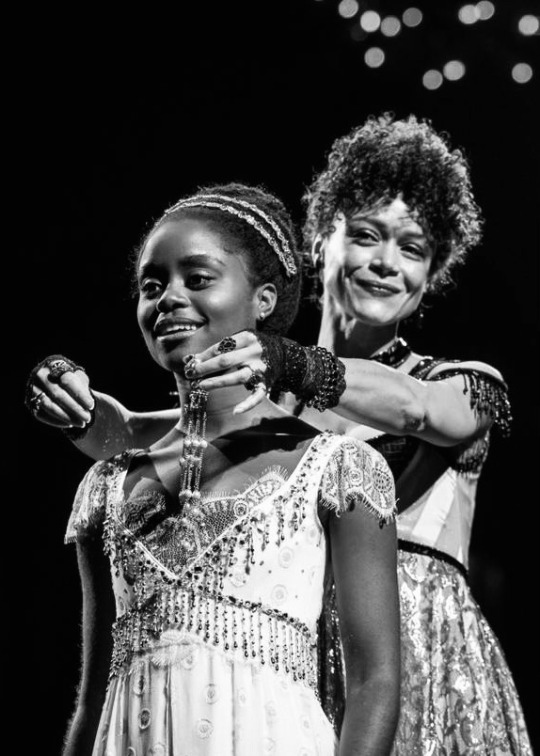
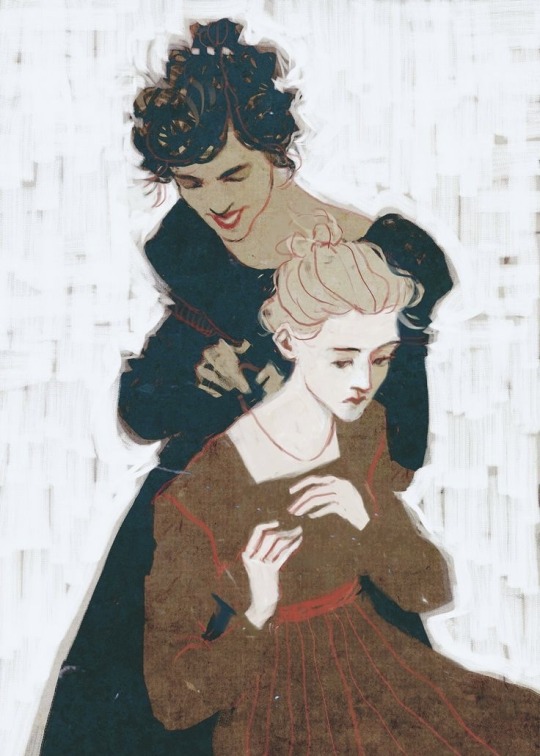
My brother is quite madly in love, he’s quite madly in love with you, my dear…
Denée Benton and Amber Gray in Natasha, Pierre and the Great Comet of 1812//Mary Crawford and Fanny Price in Mansfield Park by Darya Shnykina
#connecting the dots as per usual#natasha pierre and the great comet of 1812#mansfield park#dave malloy#jane austen#musical#letteratura#malloysicals#fanny price#mary crawford#denee benton#amber gray
123 notes
·
View notes
Text
No sooner had Susan and her cousins left their box at the intermission than they came face to face with Miss Crawford and a gentleman exiting another box a few doors down. The gentleman was a stranger to Susan but the similarity of his appearance to the lady was such as made his identity as obvious as it was unanticipated.
Julia stopped dead and even Miss Crawford, usually so self-possessed, blushed and hesitated. Her brother too seemed struck by astonishment at the sight of the party. Only Mr. Yates, whose happy disposition did not admit of any embarrassment, was unperturbed.
“Crawford!” he boomed. “This is capital! No idea you were in the country, let alone in town! It's been years! But of course we should meet at the theatre - where else? You remember my wife, of course? And this is her cousin, Miss Price. Susan, this is the famous Mr. Crawford.”
Susan was as surprised as the others but for different reasons. This was the infamous Mr. Crawford? Her cousin had ruined herself and plunged her family into disgrace for him? Why, he was such a short and slight man! Susan was on the taller side of average for her sex but she was nevertheless unaccustomed to stand eye to eye with a man in the way she was able to with Mr. Crawford. And those expressive, dark features - so elegant and pretty on his sister - were not so attractive on the gentleman. He cut an insignificant sort of figure, especially when put next to the broad bulk of Mr. Yates, who loomed over them all in his usual way. She had only met him briefly many years ago but he had seemed taller and more impressive in her memory.
What was she to say to him? She did not desire an introduction; indeed, Yates probably ought not to have done it. She could not see Julia’s expression but her silence was speech enough. Perhaps she could cut him, she could give him the cut direct and walk straight past him with her head held high and Fanny in her heart… except of course that she did not dare.
In the event, he was the first to speak. The awkwardness and evident embarrassment of his address as well as its obvious insincerity as he reacquainted himself with Mrs. Yates and professed a delight to meet Miss Price gave Susan the courage to respond with a clear and direct look, “How do you do, Mr. Crawford? But we have met before in Portsmouth five years ago; perhaps you do not recall.”
Surprise crossed his face. “I do recall our meeting. How could I forget?”
How indeed? Later, she would think of many retorts, albeit none of them suitable to be spoken aloud. Instead she found herself asking if was enjoying the play.
“With reservations,” he replied, his gaze never straying from hers. “And yourself, Miss Price?”
“Tolerably,” said Susan at the same time as Mr. Yates jumped in to inform them that this was Miss Price’s first ever visit to the theatre and how important it was that it was to such a wonderful production as The Distress’d Mother and had they ever seen anything so touching as Andromache’s tragic devotion?
“I find her a little too pious for my own taste,” interjected Miss Crawford. “I find myself drawn to Hermione and I cannot feel ashamed of it. But you have a very fine performance in Orestes for your first play, Miss Price. You have chosen well.”
Susan acknowledged that it was so and that she was very much looking forward to seeing him go mad in the final act. Yates declared there was no better actor anywhere in Europe and seemed on the point of anticipating the mad scene itself in the corridor when Julia finally roused herself to insist that the performance must be starting soon and hurried Susan back into the box, leaving the Crawfords behind to make of Mr. Yates’ paroxysms of dramatic enthusiasm what they would.
As for Susan, her spirit was disturbed by the meeting but she was determined that Mr. Crawford should not have any power over her - he had done quite enough damage by the Bertrams already for her to wish to give him any further satisfaction. Her attention should be devoted solely to the progress of the drama on stage before her. Nevertheless, it was strange to think that such a man should have been so captivating to both her cousins - he was not even handsome! And his address, well, there was nothing extraordinary about it. She could not understand it at all. And as for his view of the play, she could not help wondering over his reservations. What a very curious way to respond to her question which she had only asked out of politeness! Really, if he had reservations, he should at the least have said what they were! And so it was that at the end of several hours, when the play finally drew to a close, mad scene and all, having vowed that Mr. Crawford’s name should not even cross her mind, she found to her consternation she had thought of little else.
#the second miss price#rose writes#mansfield park#fanfiction#susan price#henry crawford#mary crawford#john yates#julia bertram
24 notes
·
View notes
Text
Henry and Mary Crawford walked so Ryan and Sharpay Evans could run
#jane austen#classic lit#classic lit meme#classic literature#jane austen meme#mansfield park#henry crawford#mary crawford
37 notes
·
View notes
Text
The Steele Family Album: Volume XIII

Peace reigns, now that kitties Tiberius and Meg have found their own favourite spots in the kitchen.
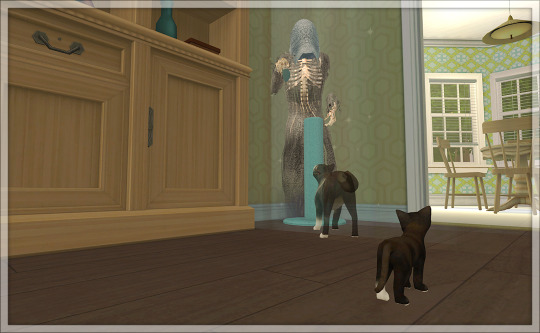
But now, it really is time to say a final farewell to Tiberius - and immediately after his kittens were born! To be honest, I think that's a bit of a low move by Grim, popping up behind the scratching post.
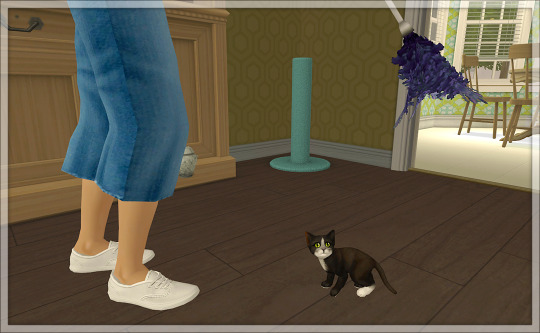
New arrival Dolly (looking so much like her dad, except that her white sock is on a different foot!) doesn't seem to know what she's supposed to do with that fuzzy thing on the end of a stick.
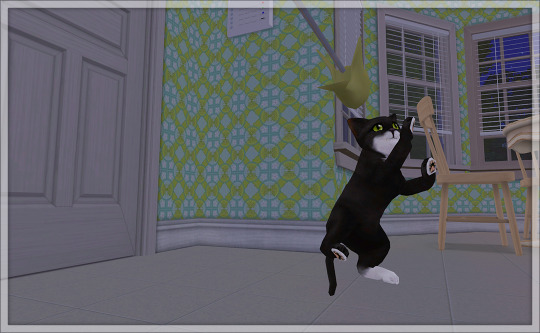
She knows exactly how to deal with the bird on a spring though!
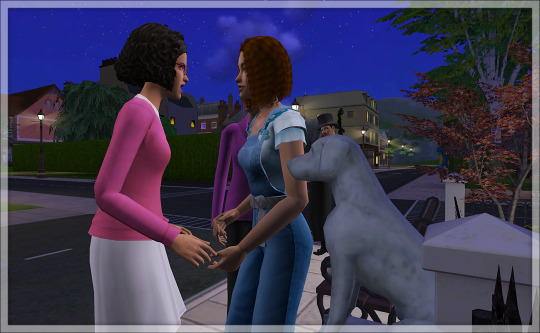
While laying Tiberius to rest, the sisters catch up briefly, but Nancy is so career-focused that the family hardly sees her these days.
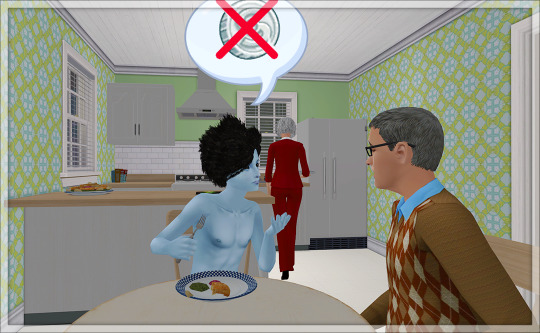
Erasmus is still at home, although not for much longer. He's always been quite an outspoken lad, and now - with the idealism of youth - spends much of his time berating his dad for his materialistic outlook. The way Erasmus sees it, there's so much more to be gained by looking beyond their mundane lives, and out into the stars!

There's also a brief visit from a lost wolf - a recently aged-up Dolly doesn't care, as long as she's not expected to give up her bed.
~ Sagittarius
~ Doofus / Independent / Aggressive / Finicky
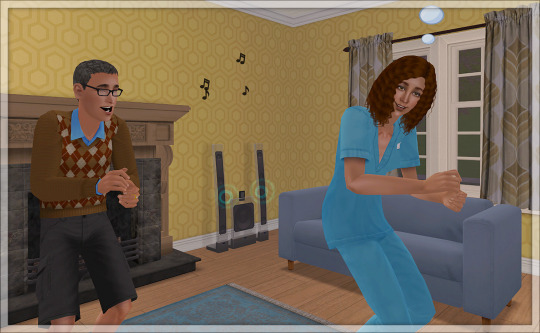
who arrives just in time to catch Father and Daughter Smustle Time. He doesn't stick around long...
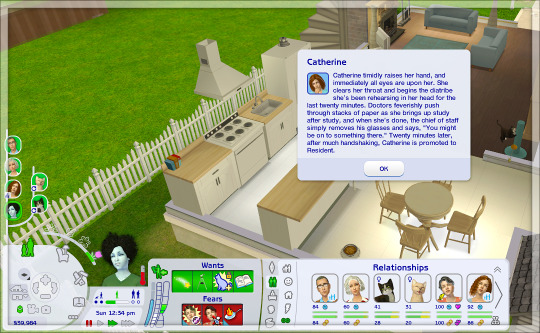

Who needs a love life, when you're enjoying meteoric success in your career? Not Catherine, it seems!
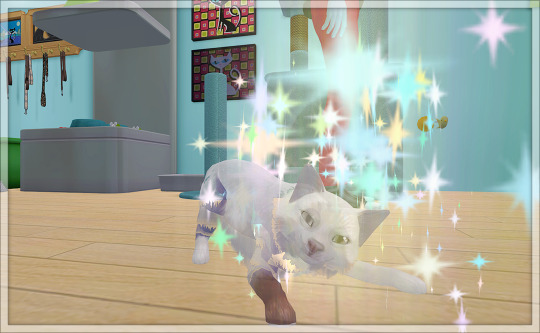

What everyone agrees that they do need however, is another cat. Enter Mozzarella (by @lesyasun - except that I seem to have accidentally given him blue fur, on top of turning her into a him)!
~ Libra
~ Doofus / Lazy / Friendly / Pigpen
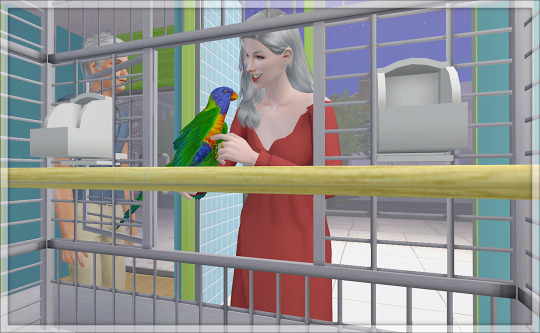
At the pet shop, Mary seems to be considering eschewing the traditional witch's familiar, in favour of a parrot.
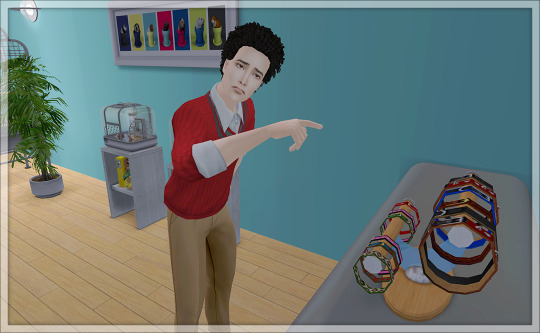
While Ambrose is made melancholic by the display on the counter: "such pretty collars - if only I had a pet to put one on!" You're in a pet shop, Ambrose...
#sims 2#gameplay#merybury#catherine steele#erasmus collins#tiberius steele#meg steele#dolly steele#mozzarella steele#nancy steele#mary crawford#ambrose elton#steele family
17 notes
·
View notes
Text
Writing Villains (Advice from Jane Austen)
One of the reasons that I find Jane Austen's novels so wonderful is that they have amazingly realistic villains, some that are fully fleshed out characters. Austen's biggest strength is that she gives her villains clear, logical motives. In fact, for many of her villainous characters you can turn the entire story around and see a rational story from the other side.
For example, Lucy Steele. She doesn't attack Elinor out of mindless evil, but because Edward Ferrars is her golden ticket to wealth and she knows that Edward loves Elinor. Lucy might twist the knife a little on Elinor out of sadism, but generally she attacks Elinor in an attempt to secure Edward. When it comes to other characters, Lucy is overly sweet if she wants something from them, otherwise she acts normally. As an example, she leaves Marianne alone because Marianne is not competing for Edward and also can't do anything for Lucy. Anne, Lucy's sister, likes her. Lucy has friends and family she stays with, she's a fairly well-rounded person.
You can put yourself in Lucy's shoes, you can turn the entire narrative on it's head and play it out from her perspective and it would make complete sense. You could even make Lucy sympathetic! She probably sees herself as a hardworking underdog, trying to wrest her one chance at prosperity away from the conniving Elinor Dashwood. I'm sure she thinks the pain she causes Elinor is justified.
If you can't do that with your villains, then there is a good chance they are just evil for evil's sake. I picked Lucy Steele on purpose because I hate when the entire motivation for a antagonist female character is "bitches be crazy". Bitches may be mean, but almost always for a good reason.
Even Mrs. Norris, who is probably the most cruel of Austen's female villains, can be perspective switched. Her life is about being useful to the Bertram family so she can feel important because her married status/wealth is lower than she wished. As she must always be deferential towards the Bertrams, she takes out her negative emotions on those below her, the servants and Fanny, while also showing off how good she is at "managing" those people. (And yes, she is your childhood bully)
We often hear her perspective and she clearly sees herself as a useful part of the family and a defender of Sir Thomas's wealth. She thinks she's a good person! Which is also an important point: most people doing wrong do not believe that they are doing wrong. That is what really makes a villain scary. Mrs. Norris thinks she's helping Fanny in a very twisted way by teaching Fanny her station in life. If you asked her, she'd give you a self-justified answer and she'd probably actually believe it.
Another way to do a good villain is to just make a person very selfish. Henry Crawford doesn't sit around all day laughing about how much pain he causes women, he doesn't think about it. He only thinks about the fun of flirting for himself, not the harm to others. The glimpses we get into her perspective are not cruel at all. It's the same with Willougby, he thinks only of his own pleasure and tries very hard to ignore that he has crushed Marianne and destroyed Eliza Williams. When he is forced to accept that people were hurt, he blames everyone but himself.
Wickham thinks that he's a victim, Caroline Bingley is ambitious and doesn't care who she steps on to get to the top, Mr. Elton is insulted that Emma could even dream he's a match with Harriet but he can't touch Emma so he punches down at Harriet. They all make sense, they all probably believe that their actions are justified.
Also, imagine taking the heroine/hero right out of the story, would the villain still act the same way? If Anne didn't exist, Mr. Elliot would still try to bring himself into the Elliot family because he was afraid of losing the title. If Elizabeth didn't exist, Wickham would have had another favourite in Meryton. If Fanny didn't exist, Mrs. Norris would have found some other puppy to kick. The villains don't just appear for the plot of the main characters, they have their own reasons for moving around and messing shit up.
Lastly, explaining but not excusing (though unfortunately some people will excuse anyway but that's not your fault). Mary Crawford is mercenary and doesn't seem to believe that love is even a real thing. It's pointed out several times in the novel that her defects have to do with being raised in an immoral environment and a broken home. She was taught by her aunt to marry for wealth and disregard love. Austen doesn't excuse Mary, she doesn't give her a happy ending, but she does explain how she came to be. She's not just greedy, she has been taught that wealth is the best recipe for happiness. As an adult now, it is her responsibility to question that maxim or remain a villain.
Austen wrote amazing morally grey characters and "villains" (a term I used a little liberally here, some of them probably only count as antagonists, not full blown villains). I love how real and human she made her characters, it's something I aspire to myself!
Linking my Caroline rant because it's related, people remove her motives so often and flatten her into a "bitches be crazy".
#jane austen#villains#avoiding “bitches be crazy”#Lucy steele#mrs. norris#mansfield park#sense and sensibility#henry crawford#mary crawford
277 notes
·
View notes
Text

AND I OP—
#JUSTICE FOR MARY CRAWFORD#this author reading JA for filth two pages in….love to see it#jane austen#mary crawford#mansfield park
44 notes
·
View notes
Text
Your favorite Mansfield Park OT3 isn't there ? Tell me and I'll make a poll with them later
#jane austen#19th century literature#mansfield park#fanny price#edmund bertram#henry crawford#mary crawford#poll
7 notes
·
View notes
Text
Can we talk about this:
“I only entreat everybody to believe that exactly at the time when it was quite natural that it should be so, and not a week earlier, Edmund did cease to care about Miss Crawford, and became as anxious to marry Fanny as Fanny herself could desire.” (Mansfield Park)
#edmund bertram#mary crawford#fanny price#mansfield park quotes#mansfield park quote#mansfield park#Jane Austen quote#jane austen characters
7 notes
·
View notes
Text
She was in a reverie of sweet remembrances.
Jane Austen, Mansfield Park (1814)
#quotes#romance#words#englit5098#jane austen#mansfield park#literature#poetry#mary crawford#regency#1810s#currently reading
10 notes
·
View notes